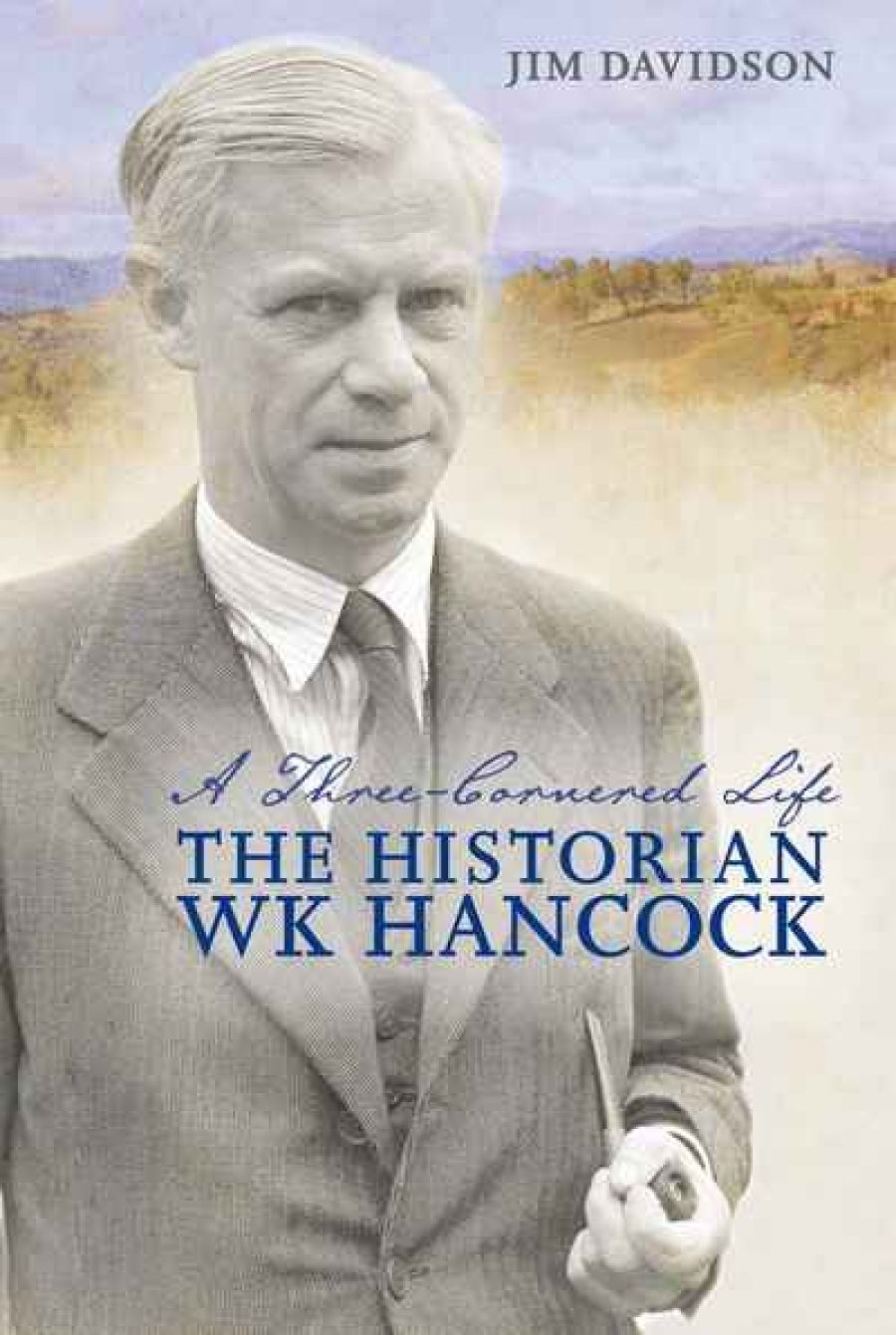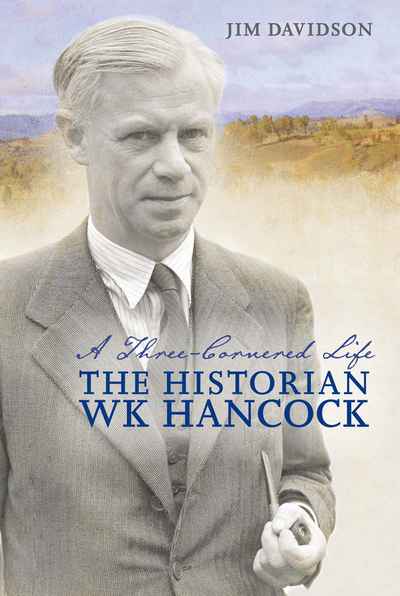
- Free Article: No
- Contents Category: Biography
- Review Article: Yes
- Article Title: ‘Attachment, justice and span’
- Article Subtitle: The doyen of Australian historians
- Online Only: No
- Custom Highlight Text:
Name a selection of your own most interesting and iconic Australians of the last century. My personal list would begin with John Monash, Donald Bradman, and W.K. Hancock.
- Book 1 Title: A Three-Cornered Life
- Book 1 Subtitle: The Historian W.K. Hancock
- Book 1 Biblio: UNSW Press, $59.95 hb, 624 pp
- Book 1 Cover Small (400 x 600):

And yet William Keith Hancock (1898–1988) was a truly great Australian, whose life and work had a significant influence on our culture and our global standing. Moreover, within the international world of scholarship and education, few stand higher. Anthony Low (former ANU vice-chancellor and later Smuts Professor at Cambridge) has nominated Hancock as ‘the most distinguished scholar in the humanities and social sciences to have been born or worked in Australia’; while Stuart Macintyre has rightly remarked: ‘If there were a Nobel Prize for History, Hancock would surely have won it.’ In modern idiom, Hancock is a ‘national treasure’. Thanks to Jim Davidson’s exhaustive scholarship and elegant prose, we at last have a pioneer biography which does him justice; and which may just put his name and achievements back into popular circulation.
Here is an extraordinary Australian life and professional career – on the global scale of the British Empire itself – of a country Victorian boy travelling from rural parsonage to citizen of the world. A Rhodes Scholarship to Oxford launched Hancock into positions of influence. He held chairs of history in Australia (Adelaide and ANU) and in England (Birmingham and Oxford, where he was several times a fellow of All Souls College). He directed influential research centres in Commonwealth studies and then in the social sciences more generally. He produced a vast and remarkably insightful Survey of British Commonwealth dynamics (1937, 1940, 1942), and then, based in Whitehall and beyond, supervised and edited the huge twenty-eight-volume official History of the Second World War series (1949–72), together with the definitive British War Economy volume (1949), written with Margaret Gowing. As an individual scholar he ranged from early studies in Italian history, Ricasoli and the Italian Risorgimento in Tuscany (1926), to a remarkable national history of his own country, Australia (1930) and a two-volume biography of the South African politician and international statesman Jan Christiaan Smuts (1962, 1968).
During African decolonisation, Hancock was invited by the British government to play a crucial diplomatic and conciliatory role in the successful emergence of modern Uganda in 1954. He ultimately received two knighthoods and nine honorary doctorates (while still declining others). When he finally returned to Australia, in 1957, it was to help shape the foundation of the Australian National University; the making of the Australian Dictionary of Biography; and the Australian Academy of the Humanities – of which he was first president and to which he deeded half of his estate. He died in August of the bicentennial year, aged ninety.
Scholars of modern history and empires, as well as of international relations, will surely value Davidson’s measured contextualising and incisive assessment of each of these major Hancock ‘projects’. It is true that Hancock ultimately left no ‘school’ of history. But what he did achieve, over the course of more than twenty original books and monographs, was to apply a highly original mind and forensic approach to subjects which had been treated with far too much reverence and gravitas – notably national history, empire and the Commonwealth. They could never be seen in the same light again.
As Allan Martin once remarked to me, after Hancock’s Australia scholars have found it very difficult to think about Australia in un-Hancockian terms. More broadly, Hancock left no general thesis about British imperialism – that was to belong to the next generation in A.P. Thornton, D.K. Fieldhouse, D.A. Low, R.E. Robinson and, especially, J.A. Gallagher – but he exposed the sinews of how the British empire actually worked, in ways which constituted a master anatomy lesson for all future imperial scholars.
What will also engage and fascinate the more general reader is Hancock’s strong sense of an evolving Australia in modern history (his notion of ‘Country’) during a singularly formative era for both empire and emerging nationality. He was the quintessential ‘Independent Australian Briton’, something as mysterious as the Trinity to modern minds. Teasingly, Hancock once characterised himself as ‘colonial and provincial’ to a British colleague; but as Davidson subtly suggests, he actually belonged to a long-lost but tangible ‘Anglophone world’ – ‘Britain with a small “b”’. This is something which a newer generation of historians are belatedly beginning to appreciate and analyse.
Hancock lived an emotional life of triangular commitments – primarily to England, Australia and Italy. But England increasingly dissolved into Empire, and South Africa ultimately loomed much larger alongside Australia. Hancock’s own autobiography, Country and Calling (1968), worked from the leitmotif that he was destined to follow a boomerang of sentiment back to his native land.
As a counterfactual aside, it is perhaps interesting to speculate what might have followed had he been elected Warden of All Souls immediately after World War II, as he had strongly desired. A restless energy and driving ambition saw him remarkably responsive to an agenda of immediate opportunities. His famed All Souls colleague, A.L. Rowse, caught this shrewdly: ‘If a door opened before him, he could not but go through it.’
Hancock naturally rose and moved within the established élites of his era. Yet, with the passage of time and his ultimate return to Australia, he followed Gladstone in that his Christian liberalism became more radical with age; he embraced causes as diverse as nuclear disarmament, the rights of women, indigenous aspirations and the natural environment. He focused his last major research project on writing a classic of Australian environmental history, Discovering Monaro: A Study of Man’s Impact on his Environment (1972).
Hancock disliked ideologies and ‘isms’ (famously he declared that ‘Imperialism was no word for scholars’), yet he wrote history with an understated moral vision. From a young age, and in the era of European fascism, he was fascinated with ‘Moloch’ (the over-mighty state). Here was a Christian humanist who ultimately found a force of goodness in history; but he had absorbed enough Machiavelli to ground that idealism in social reality. An esteemed British colleague remarked that all of Hancock’s many books were, ultimately, ‘a confession of faith’. The cadences of the Anglican Book of Common Prayer echo in his austere prose.
Recent imperial scholarship has been much interested in exploring gender and empire. Hancock’s life throws a sharp and revealing light on how much that empire, its networks and culture, was essentially a male preserve. We learn that Hancock himself had seriously considered writing a major study of Milner’s precocious policy officers – the ‘Kindergarten’ – in post-Boer War South Africa, having later known and worked with some of its leading members.
Davidson, in an excellent chapter, provides a sensitive account of Hancock’s long and often difficult first marriage to Theaden Nancie Brocklebank, a fellow Victorian (they married in London in 1925). Hancock himself burned all her letters within two days of her death, aged sixty-two, in 1960. His remorseless work proclivities ultimately affected both his health (one near breakdown) and the marriage itself: ‘Increasingly Hancock was haunted by a sense of guilt. Theaden’s was a life under-achieved, and Hancock felt he must bear the responsibility’, is Davidson’s considered judgement.
Hancock had a distinctive presence. His description of Jan Smuts could have been a self-portrait: ‘a little, tough wiry man like a fox terrier …’ There was huge energy; but also huge reserve. ‘He was always gathered’, as his biographer writes; ‘there was an edge even about his silences’.
My own first personal encounter with Hancock was unfortunately explosive. In 1966 he came to our imperial research seminar at Nuffield College, Oxford, to present what I later realised was a central theme dealing with race in volume two of his Life of Smuts. I disagreed strongly with what I took to be a fundamental and momentous failure in this key aspect of Smuts’s thinking and politics. Hancock responded with icy precision, ultimately calling me a ‘Slim Jannie’ (‘Sly/Crafty Johnny’) for my critical arguments (the derogatory term often then applied in South Africa to Jan Smuts himself). Davidson now reveals the depth of Hancock’s private attachment to Smuts (indeed his ‘love for Smuts’) – one who had ‘become an idealised larger projection of himself’. The doyen of South African liberal historians (T.R.H. Davenport) quietly commented that Smuts was ‘an old man’s book about an old man’. Others then and since have been harsher in their critique.
Hancock must have forgiven, or forgotten, my youthful challenge: when we were later colleagues at ANU in the 1970s, he would knock at my study door in the Coombs building and ask if I was going to the bank that day – his indirect call for a walk on the campus, where we freely talked history. (He urged me to write a study of twentieth-century labour in South Africa.) He had the wonderfully endearing habit, when he met any new scholar, of asking earnestly: ‘What is your Question?’ (viz. what are you researching?). He would then seriously engage with those interests.
Hancock was nervous of being the subject of a biographical study. He need not have worried. As a distinguished former Meanjin editor, Davidson brings to his task an appreciation of Australian history and culture, coupled with a close understanding of ‘Commonwealth’ (he has written incisively on the Dominions), a grasp of social complexities on the African veldt (having edited Trollope’s South Africa), plus an association with Hancock (and the academic milieu in which he operated) over many years.
Hancock’s own famous dictum was towards writing history with ‘attachment, justice and span’. Jim Davidson has met the austere criteria in a truly scholarly and absorbing biographical study of ‘W.K.H.’. The great historian has found his Boswell.


Comments powered by CComment